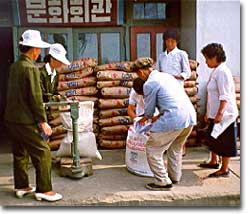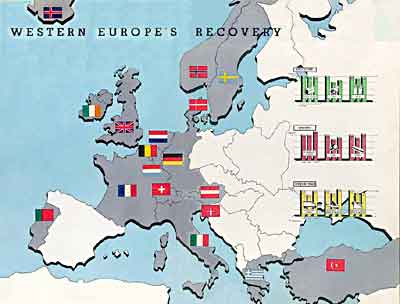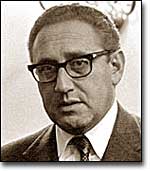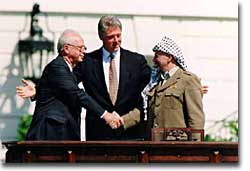How And Why Did U.s. Foreign Policy Change From 1945 To 1991?

11a. Foreign Policy: What At present?

The United states of america exercises its strange policy through economic aid. For example, famine relief in North Korea provides not merely humanitarian assistance but besides a foothold for the development of autonomous ideals and institutions.
George Washington'southward Cheerio Address in 1789 contained one major piece of advice to the country regarding relations with other nations: "avoid entangling alliances." Those words shaped The states foreign policy for more than a century.
Today some Americans think that Washington's words are still wise ones, and that the United States should withdraw from world affairs whenever possible. In truth, yet, the The states has been embroiled in world politics throughout the 20th century, and every bit a effect, strange policy takes up a great bargain of authorities's time, energy, and coin.
If isolationism has become outdated, what kind of strange policy does the United States follow? In the years after World War II, the United States was guided generally by containment — the policy of keeping communism from spreading beyond the countries already nether its influence. The policy applied to a globe divided past the Common cold War, a struggle between the United States and the Soviet Union.
With the collapse of the Soviet Wedlock in 1991, containment no longer made sense, and so in the past x years, the United States has been redefining its foreign policy. What are its responsibilities, if any, to the rest of the earth, now that it has no incentive of luring them to the American "side" in the Common cold War? Do the United States withal need allies? What action should be taken, if any, when a "hot spot" erupts, causing misery to the people who live in the nations involved? The answers are not easy.

The economic side of containment: the Marshall Plan was devised to prevent communist takeover of European nations past pumping American aid into the ailing economies and infrastructures of Western Europe.
Foreign Policy Goals
To investigate the nature of current United States strange policy, the logical source is the State Department, whose chore it is to define and direct it. Foreign policy goals include the following:
- Preserving the national security of the U.s.
- Promoting world peace and a secure global environment
- Maintaining a residuum of ability amid nations
- Working with allies to solve international bug
- Promoting democratic values and human rights
- Furthering cooperative foreign trade and global involvement in international trade organizations
Examining these goals closely reveals that they are based on cooperation with other nations, although "preserving the national security of the United states of america" implies possible competition and conflict.

Who Makes Foreign Policy?

Henry Kissinger served as National Security Adviser and Secretary of Country under Presidents Nixon and Ford. He was a key figure in articulating U.S. foreign policy during the Cold State of war.
As with all policy making, many people and organizations take a hand in setting United states foreign policy. The master objective of foreign policy is to use affairs — or talking, meeting, and making agreements — to solve international problems. They effort to go along problems from developing into conflicts that require military settlements.
The President almost always has the main responsibility for shaping foreign policy. Presidents, or their representatives, meet with leaders of other nations to endeavor to resolve international problems peacefully. According to the Constitution, Presidents sign treaties with other nations with the "communication and consent" of the Senate. Then the Senate, and to a lesser extent, the Business firm of Representatives, likewise participate in shaping strange policy.
The Secretary of State and many other officials of the State Department play major roles in setting foreign policy. The Secretary of State is usually the President's principal foreign policy adviser, and he or she is the main coordinator of all governmental actions that affect relations with other countries.
The Foreign Service consists of ambassadors and other official representatives to more than 160 countries. Ambassadors and their staffs set up embassies in the countries recognized by the United States and serve as an American presence away. The embassies are office of the State Section, and they protect Americans overseas and are responsible for harmonious relationships with other countries.

Presidents can play a prominent role in the formation of foreign policy by brokering negotiations between disputing parties. Here, President Clinton meets with Palestinian President Yasser Arafat and Israeli Prime Minister Yitzhak Rabin.
The National Security Council, as function of the Executive Office of the President, helps the President deal with foreign, military, and economic policies that affect national security. It consists of the President, the Vice President, the Secretarial assistant of State, the Secretary of Defense, and others that the President designates. The National Security Adviser — who coordinates the Council — sometimes has every bit much influence equally the Secretarial assistant of State, depending on his or her human relationship with the President.
The Cardinal Intelligence Agency (CIA), one of the best-known agencies that sets foreign policy, gathers, analyzes, and transmits data from other countries that might be important to the security of the nation. Although the CIA is notorious for its participation in "spy" piece of work and "elevation clandestine" investigations, much of its work is public and routine. The CIA Director is appointed past the President and confirmed by the Senate.
United States foreign policy has changed dramatically from George Washington's twenty-four hour period. Although Americans ever pay attention to the advice of their revered founder, the world is of grade not the same. The many people that shape American foreign policy today accept the fact that the The states is a member of a globe community that cannot afford to ignore the importance of getting along.
How And Why Did U.s. Foreign Policy Change From 1945 To 1991?,
Source: https://www.ushistory.org/gov/11a.asp
Posted by: kylefractoggen.blogspot.com


0 Response to "How And Why Did U.s. Foreign Policy Change From 1945 To 1991?"
Post a Comment